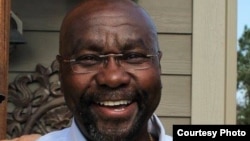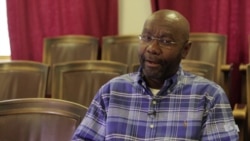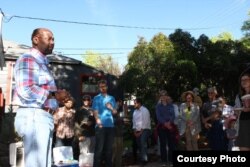In a victory some claimed was a repudiation of President Donald Trump's stringent refugee policy and others saw as a vindication of the American Dream, voters in Helena, Montana, elected Wilmot Collins, a former refugee from Liberia, as their mayor Tuesday.
He will be the first African-American mayor in the state's history.
"There are no limits," Collins, 54, told VOA. "I arrived in this country with 25 cents in my pocket. Do you think I was thinking of ever running for mayor? No! But I worked hard and I had the support of my family, and my community."
Collins said he told his children that with those elements in place, "there is no reason why you can't succeed at what you attempt to do."
Collins and his wife were part of a wave of Liberians fleeing their country's bloody civil in the early 1990s. Two of his brothers were killed in that struggle.
The couple arrived in Ghana but were unable to leave, and they nearly starved. His wife, however, had been a high school exchange student in Helena. She contacted her host family, asked for help and was offered a college scholarship there.
WATCH:
Separate arrivals
About two weeks before leaving Ghana for the U.S., the couple learned she was pregnant. They decided she should make the trip solo, in the hope that he soon could follow. After several unsuccessful attempts to get a visa, Collins applied for refugee status through the U.N. High Commissioner for Refugees.
"And two years and seven months later, I finally joined my family," he said. "I saw my daughter for the first time when she was turning 2 years old."
Even as his plane was landing in Helena, Collins realized that the "real America" was a very different place than the Montana portrayed in the movies and television shows he had seen back home.
"When I heard the pilot announcing on the intercom it's warm at 33 degrees [1 degree Celsius], I thought he was crazy!" Collins said. "The average temperature in Liberia is 80 plus degrees [27 C plus]. And this guy is talking about 33 degrees as warm!"
An even bigger surprise hit Collins when learned there were almost no other black people in Montana. (The state is 92 percent Caucasian and 5 percent Native American; people of other origins make up the remaining 3 percent.) He said that was a lonesome feeling, but he would not "let it slow me down." He was content simply to be reunited with his family.
Two weeks later, Collins started work as a school janitor. So, he said, when people say that refugees don't contribute in the United States, "that is so inaccurate. I didn't get anything for free."
Collins said he thought he and his wife were the among the first refugees to be settled in the Helena area. Before long, he found himself trying to counter the common misconception that they were undocumented immigrants.
"Your government accepted us here," he told Montanans who doubted them, "and all I ask for is a second chance. I will not disappoint you."
Collins noted that he continued to work hard and do his best to become a model citizen. Along the way, he picked up a bachelor's degree and an advanced degree, and he became a child protection specialist with Montana's Department of Health and Human Services.
Collins also began speaking regularly in high schools about his own stories and general refugee issues. He would note many similarities between his life in Liberia and his listeners' lives in the U.S.; like many of them, he had gone to a university, and he loves to play baseball and tennis. He told them he loved Liberia and never would have left but for the country's horrific civil war.
"And so I talked about real-life situations with them. And most times, when they hear the real truth from the person, it's mind-boggling," he said. "They realize, 'OK, this guy is just like us. He [just] had a rough patch in his life.' "
Some trepidation
Not everyone can be counted on to be accepting of the new mayor in traditionally conservative Montana, and the state has some of the most permissive gun laws in the United States.
"It makes me and my family nervous because … there are crazy people out there, and someone may not want me to do this," he said. "Everybody in Montana carries a gun."
Still, despite those concerns, Collins said he was bound to embrace his heightened public role.
"The voters spoke and they said, 'Hey, you know, with your story and with your experience, it's you we want.' "
As mayor-elect, Collins is excited by the opportunity to, in his words, "give back to the community" that has given him so much. His platform included beefing up the fire department, police department and other emergency services. He also is committed to creating affordable housing for homeless veterans and teenagers, because "I was homeless myself!"







